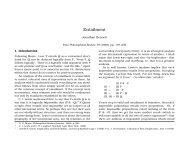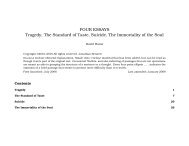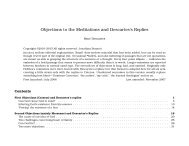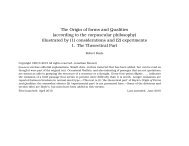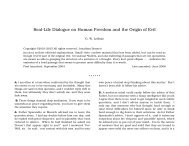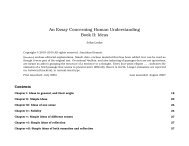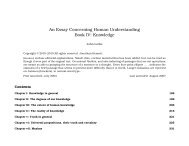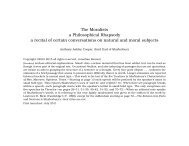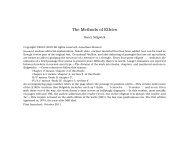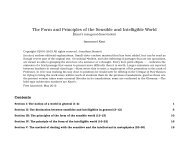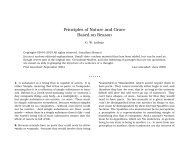A Vindication of the Rights of Woman with - Early Modern Texts
A Vindication of the Rights of Woman with - Early Modern Texts
A Vindication of the Rights of Woman with - Early Modern Texts
Create successful ePaper yourself
Turn your PDF publications into a flip-book with our unique Google optimized e-Paper software.
The <strong>Rights</strong> <strong>of</strong> <strong>Woman</strong> Mary Wollstonecraft 6: Effects <strong>of</strong> <strong>the</strong> early association <strong>of</strong> ideas<br />
selves, when that seems to be <strong>the</strong> inevitable consequence<br />
<strong>of</strong> <strong>the</strong>ir education. Those who live to please must find <strong>the</strong>ir<br />
enjoyments, <strong>the</strong>ir happiness, in pleasure! We never do<br />
anything well unless we love it for its own sake—a trite<br />
remark, but a true one.<br />
Pretend for a moment that at some future time women<br />
will become what I sincerely wish <strong>the</strong>m to be. Then love will<br />
acquire a more serious dignity, and be purified in its own<br />
fires; and because virtue will give true delicacy to women’s<br />
affections <strong>the</strong>y will turn <strong>with</strong> disgust from a rake. When<br />
that time comes <strong>the</strong>y will •reason as well as •feel—whereas<br />
feeling is all <strong>the</strong>y can do at present—so that it will be easy for<br />
<strong>the</strong>m to guard against surface graces, and learn to despise<br />
•<strong>the</strong> sensibility that had been aroused in <strong>the</strong> ways <strong>of</strong> women<br />
and <strong>the</strong>n grown stale <strong>the</strong>re, <strong>the</strong> sensibility whose trade is<br />
vice; and •allurement’s wanton airs. They will recollect that<br />
<strong>the</strong> flame. . . .<strong>the</strong>y wanted to light up has been exhausted by<br />
lust, and that <strong>the</strong> sated appetite, losing all taste for pure<br />
and simple pleasures, can be aroused only by licentious<br />
arts <strong>of</strong> variety. What satisfaction could a woman <strong>of</strong> delicacy<br />
promise herself in a union <strong>with</strong> such a man, when <strong>the</strong> very<br />
artlessness [here = ‘sincerity’] <strong>of</strong> her affection might appear<br />
insipid?. . . . One grand truth women haven’t yet learned,<br />
though it would do <strong>the</strong>m a lot <strong>of</strong> good if <strong>the</strong>y acted on it,<br />
namely: In <strong>the</strong> choice <strong>of</strong> a husband <strong>the</strong>y should not be led<br />
astray by <strong>the</strong> qualities <strong>of</strong> a lover—because a husband, even<br />
a wise and virtuous one, can’t remain a lover for long.<br />
74<br />
If women were more rationally educated and could take a<br />
more comprehensive view <strong>of</strong> things, <strong>the</strong>y would be content<br />
to love only once in <strong>the</strong>ir lives; and after marriage calmly let<br />
passion subside into friendship—into that tender intimacy<br />
which is <strong>the</strong> best refuge from care. Friendship is built on<br />
such pure, calm affections that idle jealousies aren’t allowed<br />
to •disturb <strong>the</strong> performance <strong>of</strong> <strong>the</strong> sober duties <strong>of</strong> life or<br />
•take up thoughts that ought to be o<strong>the</strong>rwise employed. This<br />
is a state in which many men live, but very few women.<br />
It is easy to explain this difference <strong>with</strong>out recurring to a<br />
sexual character [i.e. <strong>with</strong>out supposing that <strong>the</strong>re are basic, natural<br />
psychological differences between <strong>the</strong> sexes]. [MW devotes <strong>the</strong> final<br />
two pages <strong>of</strong> this chapter to <strong>the</strong> explanation in question.<br />
It doesn’t add any content to things she has said already,<br />
except for this sad footnote about <strong>the</strong> fate <strong>of</strong> those ‘who have<br />
not sufficient mind to be amused by innocent pleasure’ and<br />
who, for one reason or ano<strong>the</strong>r, have <strong>with</strong>drawn from <strong>the</strong><br />
scene <strong>of</strong> uninnocent pleasure:]<br />
I have frequently seen this exemplified in women whose<br />
beauty could no longer be repaired. They have retired from<br />
<strong>the</strong> noisy scenes <strong>of</strong> dissipation; but, unless <strong>the</strong>y became<br />
Methodists, <strong>the</strong> solitude <strong>of</strong> <strong>the</strong> select society <strong>of</strong> <strong>the</strong>ir family<br />
connections or acquaintance has presented only a fearful<br />
void; consequently nervous complaints and all <strong>the</strong> vapourish<br />
train <strong>of</strong> idleness rendered <strong>the</strong>m quite as useless as, and far<br />
more unhappy than, <strong>the</strong>y were when <strong>the</strong>y joined <strong>the</strong> giddy<br />
throng.



